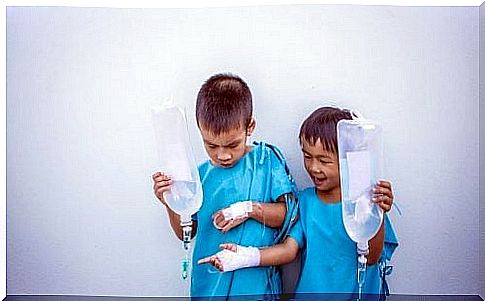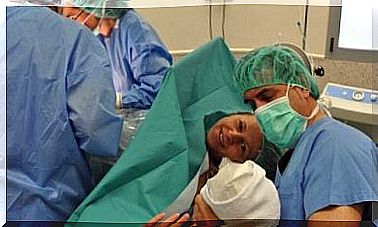Meet Some Illnesses That Don’t Need Treatment

Many parents think the best solution is medication because that’s how they treat themselves. However, many of the illnesses children are subject to do not need medicine.
They heal themselves when the body’s own defenses and antibodies do their job.
Children can overcome the most common illnesses with their own defenses. In most cases, the use of antibiotics is not necessary.
You should keep in mind that not all medicines cure illnesses, they only alleviate the symptoms caused during the recovery period.
You may find that most viral illnesses that affect children tend to heal themselves in just a few days.
Also, there are many infections that do not require antibiotic treatment. One is the flu.
The flu is a more serious illness than the cold. It presents with a high fever, dry cough and general malaise. When this occurs, there is usually no nasal mucus.
Influenza is caused by a virus and has many varieties that are constantly changing. There is indeed a flu vaccine, but it changes every year because the virus mutates.
However, if your child has a chronic illness such as asthma, it is advisable to vaccinate him against the flu.

The medicine doesn’t cure the cold, it just makes it more bearable
Keep in mind that the flu shot doesn’t stop the cold. That’s because they are different diseases.
Again, antibiotics are useless against colds unless a bacterial complication such as pneumonia has arisen.
Treatments only serve to alleviate symptoms, such as antipyretics that reduce fever and alleviate pain but do not shorten the duration of the illness. The child’s defenses are responsible for this process.
The common cold, unlike the flu, has symptoms such as a runny nose, cough, and sometimes fever. Nasal mucus is usually watery at first. Then it turns white, yellow, green and thick.
When the mucus turns green and dry, the child is already healed and ready to go out in the cold again. The cold itself is not responsible for causing this infection, but a virus.
However, there are hundreds of different viruses that can cause colds. That is why it is not possible to make a vaccine. Antibiotics are also not helpful against the cold.
In addition to unnecessary expense and side effects, overuse of antibiotics can build resistance in certain types of bacteria and no longer have an effect.
If your child has a fever, you can give them a fever. If the cough is so intense that it won’t let the child sleep, give a cough syrup. But if it’s bearable, you should let her cough to expel the mucus.
The use of nasal decongestants or vasoconstrictors is not recommended for children under twelve years of age.

Some medications do not have a really effective effect. This is the case of expectorants, which serve to increase cough and mucus, mucolytics, which are useful to thin the mucus, and antihistamines, used for allergies.
The same goes for vitamin C in natural and alternative products. If the child gets better over time, it may not be because of the medicine he took, but because his body did its job.
There are diseases that can cure themselves
Acute otitis can be caused by viruses or bacteria and has been treated with antibiotics for decades.
When a child has a fever and no longer has any symptoms, doctors often diagnose otitis because it’s easy to convince yourself that the eardrum is a little red.
Several scientific studies argue that treatment for otitis is practically useless. It does not shorten the disease and does not reduce pain. Furthermore, it also does not improve hearing.
Treatment is warranted in children under the age of two who have a high fever, children who are generally unwell, children with bilateral otitis or prolonged illness.
Pharyngitis means inflammation of the throat. The main symptom is pain that increases when swallowing.
In many cases, this disease is caused by a virus. That’s why antibiotics are completely useless.
In other cases, it is caused by a bacteria ( Streptococcus ). When this happens, your doctor may prescribe penicillin to prevent a more serious complication like rheumatic fever.
Streptococcus bacteria usually cause fever above 38.5°C, but not cough or runny nose. If the sore throat is accompanied by a cough and a runny nose with little or no fever, it is almost certainly caused by a virus.
Penicillin is not meant to cure a throat infection, but to prevent rheumatic fever.








